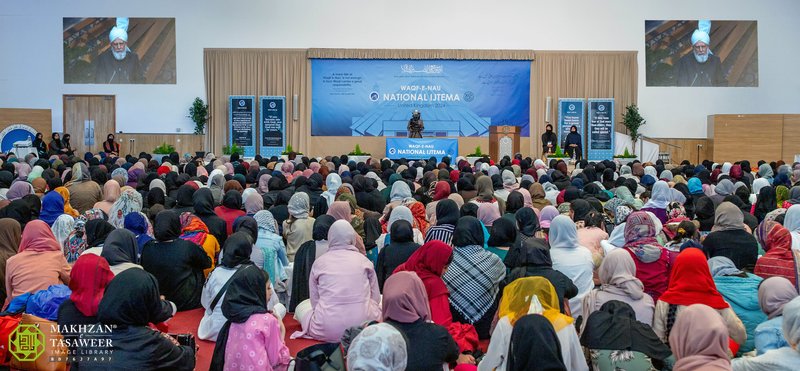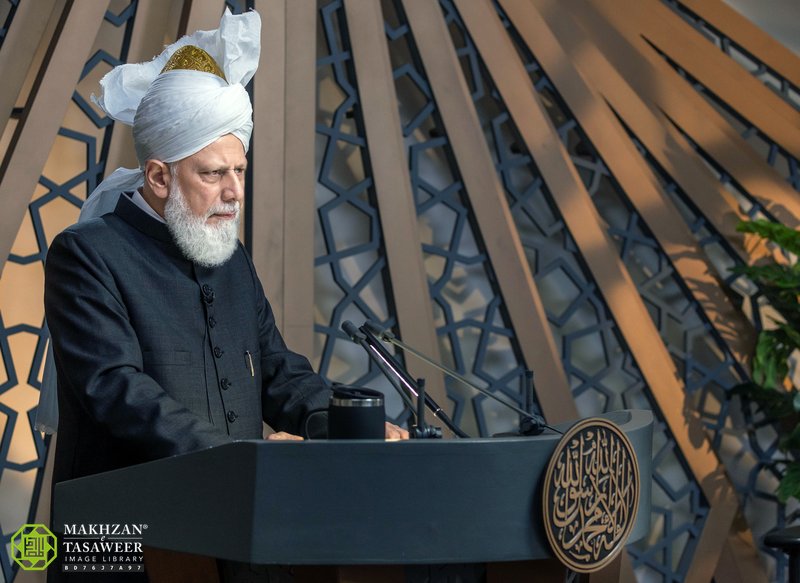
In the evening of Saturday, 25 May, Hazrat Amirul Momineen, Khalifatul Masih V, may Allah strengthen his hand, presided over the UK’s Waqifaat-e-Nau Ijtema 2024. The event took place in Baitul Futuh, London, while Huzooraa graced the occasion via livestream in Islamabad, UK.
After conveying “Assalamu alaikum”, Huzooraa invited Daniya Ahmad Sahiba to recite a portion of the Holy Quran (Surah Aal-e-Imran, verses 103-105). Kashifa Idrees Sahiba presented the English translation of the Quranic verses. Laiqa Ahmad Bhatti Sahiba then recited an Urdu poem written by Hazrat Musleh-e-Maudra along with its English translation.
Huzooraa then enquired why Farhana Luqman Sahiba, whose name was on the programme copy Huzooraa had for English translation of the Urdu poem, did not present the English translation. Huzooraa was told that it was a change that took place after a copy of the programme was presented to Huzooraa.
Huzooraa then invited muavina sadr waqifaat-e-nau to present the ijtema report. The muavina sadr thanked Huzooraa for blessing the occasion with his precious time. Huzooraa was informed about various workshops and events that took place throughout the day.

Huzooraa then took to the podium and delivered his address. After reciting tashahud and ta‘awuz, Huzooraa said that it was the grace of Allah that another waqifaat-e-nau ijtema was being held. Huzooraa said:
“As members of waqifaat-e-nau, you comprise those ladies and girls whose parents dedicated their lives to the service of their faith before their birth. Those of you who have reached the age of 15 and above have independently renewed this noble pledge to spend your lives in the service of your religion. Further, with the grace of Allah, many older members of waqifaat-e-nau have now become mothers and are raising the next generation of waqifeen-e-nau.”
Huzooraa then said that this responsibility was two-fold: they must honour their pledge on a personal level and instil these values in the next generation. Huzooraa said that their primary responsibility was “the proper moral training of their children so that Islamic teachings and values are instilled within them from a young age and they grow to become devoted servants of their faith.”
Waqifaat-e-nau wives should also be a means of encouraging their husbands to lead righteous lives and it is only through this they can inspire the next generation to establish a firm bond with Allah and lead pious lives. It is important that such homes are filled with virtue, piety and the worship of Allah.
Waqifaat-e-nau must also safeguard and protect their prayers. They must offer them on time and with sincerity, humility and deep concentration so that an unbreakable bond of loyalty and love is fostered with Allah. In each prayer, they should pray for their children’s pious and future loyalty to Allah.
Those waqifaat-e-nau who were not yet married should remember that their sole purpose is to establish an unbreakable bond with Allah through salat. All five daily prayers must be offered on time as opposed to offering just two or three prayers a day.
“Remember, you can only achieve your religious objectives through prayer and by forging a sincere bond with God wherein you become ready and willing to make any sacrifice for His sake. Otherwise remaining within the Waqf-e-Nau scheme is futile and meaningless. Take inspiration from the noble and honourable women who have come before you throughout history. Countless women from the communities of the prophets of God made outstanding sacrifices for their faith and religious beliefs.”

Huzooraa then cited the example of the female disciples of Prophet Jesusas who showed immense courage for their faith. Christians continue to take great pride in such women who remained faithful to Jesusas. When Jesusas was put on the cross, the male disciples all fled in fear whereas the female disciples stayed loyal in spite of the grave threat of punishment and persecution from the governing authorities. They found the tomb he was placed in and tended to his wounds and took him to safety. Those pious women proved themselves worthy of any sacrifice for their faith.
Then, during the era of the Holy Prophet, peace and blessings of Allah be upon him, the examples of female companions was so high that it set a standard unmatched in history. They put great emphasis in learning their faith and putting it into practice. This passion was a means of spreading the faith of Islam to others.
The example of Hazrat Umar’sra sister is very well-known and every fibre of her being was dedicated to the service of the Holy Quran. As such, she invited a learned companion of the Holy Prophetsa who recited the Holy Quran and explained its meaning to her and her husband.
When Hazrat Umarra suddenly arrived in their house, she hid the Muslim teacher, but when Hazrat Umarra came to learn of what was going on, he lunged forward to punch his brother-in-law in a fit of rage. His sister leapt forward and she was struck in the face by Hazrat Umarra, yet she did not step back. She said he could do whatever he wished, but they would never forsake the teachings of Islam. His rage was suddenly dampened and he felt embarrassed over his actions. He, therefore, asked to hear some verses of the Quran.
His sister first laid out some conditions and then allowed the teacher to recite the verses of the Holy Quran. His heart was overwhelmed by the beauty of the Holy Quran that “having entered his sister’s home as a fierce opponent of Islam, he left convinced of its truth and immediately went to the Holy Prophetsa and accepted Islam.” This was all due to the boundless courage of one woman.
Similarly, in his series of Friday sermons on the Companionsra of the Holy Prophetsa, Huzooraa said he had spoken on several female companions of Prophet Muhammadsa, such as Hazrat Umm-e-Ammarara who displayed great fortitude for the sake of Islam. Such noble female Companionsra showed unconditional love to the Holy Prophetsa and served as timeless examples for Ahmadi women and girls, especially members of waqifaat-e-nau.
Thus, aside from studying the Holy Quran and inculcating love for Allah, our foremost objective should be to establish a profound love for the Holy Prophetsa in our hearts. If this happens, every instruction of Allah and His Messengersa will be followed and only then will they be able to fulfil their duties.
Towards the end, Huzooraa said:
“May Allah the Almighty grant all of you the capability to do justice to the demands and obligations of being a part of the Waqf-e-Nau scheme. Moreover, may this ijtema not merely prove a means for you to gather together for the day and spend time in each other’s company; rather, may you all leave this ijtema with a burning desire to bring about a spiritual and moral revolution within yourselves and a steadfast commitment to live your lives as true Muslims. May all of you come to possess an unshakeable conviction in the truth of your faith so that you can respond confidently and without hesitation or fear to all those who raise questions or make false allegations about Islam. May it be that you never fall prey to any sense of embarrassment or complex about your faith and religious beliefs. Indeed, may it be that you acquire the inner strength and courage to manifest your faith fearlessly and to live according to the teachings of Islam at all times.
“For instance, upon reaching the age of maturity, you should wear a headscarf in public and dress modestly at all times. Never fear what other people will say or think. Be confident and proud in who you are and what you represent.
“Similarly, continually focus on increasing your religious knowledge because the true jihad of this era is to convey Islam’s magnificent teachings far and wide. Certainly, it is the duty of waqifaat-e-nau, girls and ladies, to play an outstanding role in tabligh. May Allah the Almighty enable you to do so.
“At the end, I pray that may all of you come to fulfil your religious and spiritual objectives in the best possible way, and may you be ever ready to make all necessary sacrifices for the sake of your faith, and may all of you be at the forefront of bringing about a spiritual and moral revolution in the world. Amin.”
Huzooraa then led all attendees in dua before conveying his salaam to all attendees and bidding farewell.
(Report prepared by Al Hakam)

